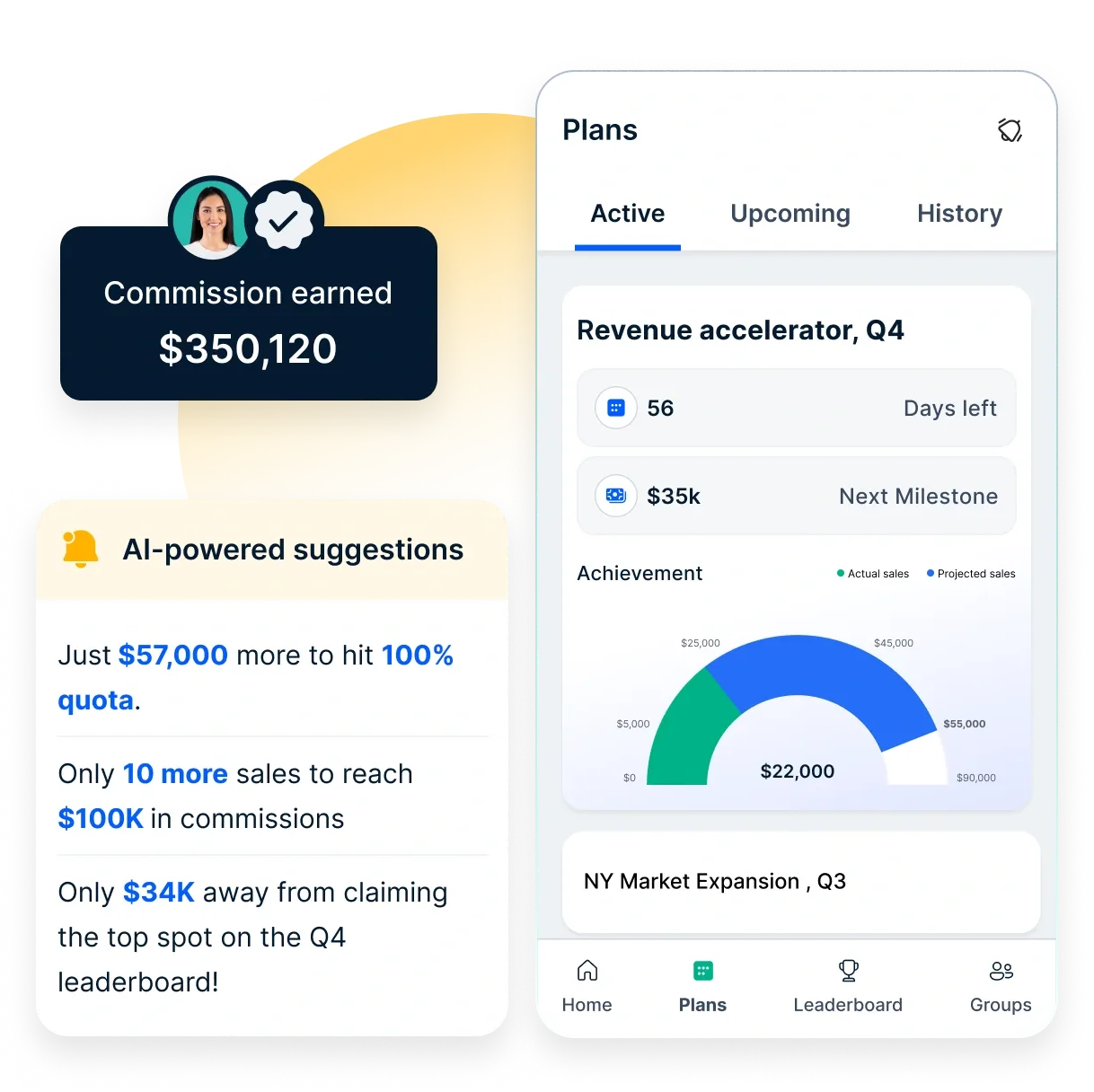Vertriebsleiter-Vergütungsplan: Struktur, 7 Schritte zum Aufbau und bewährte Praktiken
Ein gut strukturierter Vergütungsplan für Vertriebsleiter bietet ein ausgewogenes Verhältnis zwischen Grundgehalt, Provisionen und Boni, um Spitzenkräfte anzuziehen und die Vertriebsleistung zu steigern. Erfahren Sie, wie Sie einen effektiven Plan erstellen können.
Auf dieser Seite
Wenn der Vertrieb ein Mannschaftssport ist, dann ist der Vertriebsleiter der Cheftrainer, der das Team anleitet, schult und motiviert, damit es seine Ziele erreicht.
Ein Vertriebsleiter spielt eine entscheidende Rolle bei der Steigerung des Umsatzes, der Festlegung von Einzel- und Teamzielen, der Überwachung der Leistung und der Aufrechterhaltung der Arbeitsmoral, insbesondere wenn Herausforderungen auftreten. Angesichts der Bedeutung dieser Rolle ist es wichtig, die richtigen Talente mit einem gut strukturierten Vergütungsplan für Vertriebsleiter zu gewinnen und zu halten, der auf die Leistung und die Unternehmensziele abgestimmt ist.
Das Letzte, was Sie wollen, ist, einen Spitzenkandidaten aufgrund einer unzureichenden Vergütungsstruktur für Vertriebsleiter zu verlieren. Aus diesem Grund ist die Entwicklung eines wettbewerbsfähigen Plans - einschließlich Gehalt, Provisionen, Vertriebsleiter-Bonusstruktur und Vertriebsleiter-Vorteile - eine strategische Notwendigkeit. In diesem Blog-Beitrag werden wir die besten Praktiken für die Planung einer effektiven Vertriebsleitervergütung und die Herausforderungen bei der Erstellung eines solchen Plans untersuchen.
Bestandteile einer Gehaltsstruktur für Verkaufsleiter
Lassen Sie uns die einzelnen Komponenten der Gehaltsstruktur von Vertriebsleitern anhand von Beispielen erläutern, um ein besseres Verständnis des Themas zu erreichen.
1. Grundgehalt:Das Grundgehaltist die grundlegende Basis für das Einkommen eines Vertriebsleiters und bietet finanzielle Sicherheit und Gewissheit. Es trägt dazu bei, das Vertriebsteam ohne Ablenkungen zu motivieren und Talente zu binden, indem es ein festes Gehalt unabhängig von Leistungsschwankungen bietet.
2. Variable Vergütung:Die variableVergütung soll die Mitarbeiter für ihre hervorragenden Leistungen und Zielerreichungen motivieren. Dazu gehören Boni und Provisionen für ihren engagierten Einsatz und ihre harte Arbeit zur Erreichung der Unternehmensziele, die zu höheren Gewinnen führen.
Wenn der Vertriebsleiter ein Grundgehalt von 90.000 $ pro Jahr hat und einen Umsatz von 1 Million $ erzielt, würde er zusätzlich 100.000 $ als Provision verdienen, so dass sein Gesamteinkommen in diesem Jahr 190.000 $ beträgt.
Dieser Rahmen gewährleistet, dass die leistungsstärksten Vertriebsmanager Anerkennung für ihre Arbeit erhalten, spornt sie an, höhere Vertriebsziele zu erreichen, und unterstützt die Entwicklung des Unternehmens.
3. Lohn-Mix-Verhältnis:DerProzentsatz des Grundgehalts im Verhältnis zur variablen Vergütung wird durch das Verhältnis der Vergütungen zueinander bestimmt. Ein angemessenes Verhältnis ist wichtig; eine hohe Grundvergütung könnte Manager, die durch Leistung motiviert sind, entmutigen, während eine zu hohe variable Vergütung zu einem unbeständigen Einkommen führen könnte. Bei Vertriebsleitern liegt das Verhältnis zwischen Grundgehalt und variabler Vergütung in der Regel bei 60:40 bis 70:30.
Lassen Sie uns nun auf die Schlüsselrollen eines Managers eingehen und darauf, wie sich dies auf seinen Vergütungsplan auswirkt.
Schlüsselrollen und Auswirkungen eines Vertriebsleiters
Vertriebsleiter spielen eine entscheidende Rolle für den Erfolg eines Unternehmens. Sie sind nicht nur für die Leitung der Vertriebsteams zuständig, sondern auch Strategen, Mentoren und Mitarbeiter, die den gesamten Vertriebsprozess gestalten. Zu ihren wichtigsten Aufgaben gehören:
- Führungsqualitäten: Inspirieren und Führen von Verkaufsteams, um Ziele zu erreichen und zu übertreffen.
- Strategische Planung: Entwicklung und Verfeinerung von Verkaufsstrategien, um sie mit den Unternehmenszielen in Einklang zu bringen.
- Mentoring und Schulung: Coaching und Unterstützung von Nachwuchskräften im Vertrieb.
- Funktionsübergreifende Zusammenarbeit: Enge Zusammenarbeit mit Marketing- und Produktteams zur Optimierung der Vertriebsbemühungen.
- Überwachung der Leistung: Verfolgung der Verkaufsleistung und Gewährleistung der Verantwortlichkeit innerhalb des Teams.
- Optimierung der Ressourcen: Effiziente Verwaltung von Budgets, Vertriebsinstrumenten und Personal.
- Erstellung von Prognosen und Berichten: Analyse von Verkaufstrends und Weitergabe von Erkenntnissen an die Geschäftsleitung.
Um sich in diesen Funktionen auszuzeichnen, muss ein Vertriebsleiter über starke analytische Fähigkeiten, strategischen Weitblick und außergewöhnliche Kommunikationsfähigkeiten verfügen. Aber wie wirkt sich dies auf die Struktur aus? Das wollen wir herausfinden.
Wie die Aufgaben eines Vertriebsleiters die Provisionsstrukturen beeinflussen
Die vielfältigen Aufgaben eines Vertriebsleiters erfordern einen gut strukturierten Vergütungsplan für Vertriebsleiter. Ein differenzierter Ansatz stellt sicher, dass die Vergütung sowohl auf den individuellen als auch auf den Teamerfolg abgestimmt ist.
Hier erfahren Sie, wie sich die Schlüsselaufgaben auf die Provisionsstrukturen auswirken sollten:
1. Strategische Ausführung
Eine Gehaltsstruktur für Vertriebsleiter sollte Anreize für langfristiges strategisches Denken und nicht nur für unmittelbare Umsätze bieten. Dazu gehört eine Vergütung für die erfolgreiche Umsetzung neuer Vertriebsstrategien, die Expansion in unerschlossene Märkte oder Prozessverbesserungen, die die Effizienz steigern.
2. Teamführung und Mentorenschaft
Da der Erfolg einer Führungskraft eng mit der Leistung ihres Teams verbunden ist, sollte ein Teil ihrer Vergütung an die Gesamtleistung des Teams gekoppelt sein. Dies kann teambasierte Boni oder Beschleuniger auf der Grundlage der erreichten Quoten beinhalten, um die Bedeutung von Führung und Entwicklung zu unterstreichen.
3. Funktionsübergreifende Zusammenarbeit
Ein effektiver Vergütungsplan für Vertriebsleiter sollte Manager für ihre Bemühungen bei der abteilungsübergreifenden Zusammenarbeit belohnen. Boni für die erfolgreiche Zusammenarbeit mit Marketing- oder Produktteams können die Abstimmung fördern und zu gezielteren Verkaufsstrategien führen.
4. Ausgleich zwischen Zielen und Prozessoptimierung
Das Erreichen von Umsatzzielen ist zwar wichtig, aber die Provisionsstrukturen sollten auch Prozessverbesserungen anerkennen, die zu einem langfristigen Wachstum beitragen. Die Belohnung von Systemoptimierungen und Effizienzsteigerungen stellt sicher, dass sich die Manager sowohl auf die unmittelbare Leistung als auch auf den nachhaltigen Erfolg konzentrieren.
Ein gut strukturierter Vergütungsplan für Vertriebsleiter sollte ein Gleichgewicht zwischen kurzfristigen Vertriebszielen und umfassenderen strategischen Zielen herstellen und eine Kultur der Führung, Zusammenarbeit und kontinuierlichen Verbesserung fördern. Schauen wir uns an, wie ihr Vergütungsplan aussehen sollte.
Wie sollte die Vergütungsstruktur eines Vertriebsleiters aussehen?
Der Vergütungsplan eines Vertriebsleiters legt sein gesamtes Verdienstpotenzial in einem Jahr fest, indem er sowohl feste als auch variable Gehaltsbestandteile kombiniert.
Dieses Gesamtgehalt wird oft als On-Target Earnings (OTE) bezeichnet und gibt an, was ein Verkaufsleiter verdienen kann, wenn er alle seine Ziele erreicht.
OTE: $180.000
Gehaltsmix: 65:35
In diesem Fall verdient der Vertriebsleiter ein Grundgehalt von $117.000 pro Jahr (65 % von $180.000), während die restlichen $63.000 (35 % von $180.000) aus Provisionen stammen - vorausgesetzt, er erreicht 100 % seiner Quote.
Im Gegensatz zu Vertriebsmitarbeitern, deren Verdienst an die von ihnen abgeschlossenen Geschäfte gebunden ist, richtet sich der Provisionsplan eines Vertriebsleiters nach der kollektiven Leistung seines Teams. Ihre Quote ist die Summe der individuellen Quoten ihres Teams, und um dieser zusätzlichen Verantwortung Rechnung zu tragen, werden ihre Ziele oft um 10-20 % angepasst.
Ein gut strukturierter Vergütungsplan für Vertriebsleiter sorgt für das richtige Gleichgewicht zwischen garantiertem Einkommen und leistungsbezogenen Anreizen. Er umfasst auch zusätzliche Leistungen für Vertriebsleiter, wie Boni, Anreize und manchmal sogar eine Bonusstruktur für Vertriebsleiter, um überdurchschnittliche Leistungen zu belohnen.
Wie entwickelt man einen strukturierten Vergütungsplan für Vertriebsleiter?
Die Erstellung eines gut strukturierten Vergütungsplans für Vertriebsleiter ist der Schlüssel zur Gewinnung und Bindung von Spitzenkräften. Befolgen Sie diese sieben Schritte, um einen Plan zu entwerfen, der mit den Unternehmenszielen übereinstimmt und die Motivation Ihrer Vertriebsleiter erhält.
Schritt 1: Ermittlung des Zielerlöses (OTE)
Die Bestimmung des richtigen OTE ist entscheidend. Recherchieren Sie, was die Konkurrenz bietet, um sicherzustellen, dass die Gehaltsstruktur Ihres Vertriebsleiters wettbewerbsfähig ist.
Wenn Ihr OTE deutlich niedriger ist, laufen Sie Gefahr, starke Kandidaten an Konkurrenzunternehmen zu verlieren. Eine wettbewerbsfähige Vergütung zieht leistungsstarke Manager an, die das Umsatzwachstum vorantreiben können.
Schritt 2: Definition der wichtigsten Leistungsindikatoren (KPIs)
Wählen Sie KPIs, die mit den Zielen Ihres Unternehmens übereinstimmen. Übliche KPIs für Vertriebsleiter sind:
- Verringerung der Kundenabwanderung und Verbesserung der Kundenbindung
- Steigendes Buchungsvolumen
- Verbesserung der Konversionsrate von Leads
- Steigerung des monatlich wiederkehrenden Umsatzes (MRR)
- Verkürzung der Verkaufszyklen
- Mehr Kundenempfehlungen generieren
Die klare Definition von Leistungskennzahlen stellt sicher, dass sich die Manager auf die Erzielung von Ergebnissen konzentrieren.
Schritt 3: Festlegen des Lohnmixes
Im Gegensatz zu Vertriebsmitarbeitern haben Manager in der Regel eine ausgewogenere Gehaltsstruktur mit einem höheren Grundgehalt als Vertriebsleiter. Dies spiegelt ihre Verantwortlichkeiten wider, zu denen Teamcoaching, strategische Planung und Geschäftsabschlüsse gehören.
Wenn beispielsweise das Verhältnis zwischen Grundgehalt und Provision bei den Vertriebsmitarbeitern 50:50 beträgt, könnte das Verhältnis bei einem Manager 60:40 oder 70:30 betragen. Diese Struktur sorgt für Stabilität und bietet gleichzeitig Anreize für gute Leistungen.
Schritt 4: Einführung eines Schwellenwerts für Provisionen
Das Hinzufügen eines Schwellenwerts kann Manager dazu motivieren, ihre Teams stärker anzuspornen.
Ein Schwellenwert bedeutet, dass die variable Vergütung nur dann zum Tragen kommt, wenn das Team ein bestimmtes Leistungsniveau erreicht. Beträgt die vierteljährliche Provision eines Managers beispielsweise 25.000 $, so erhält er sie nur, wenn sein Team 85 % seiner kollektiven Verkaufsquote erreicht hat.
Schwellenwerte funktionieren am besten, wenn ein strukturierter Vertriebsprozess und ein erfahrenes Team vorhanden sind. Für Start-ups oder neu aufgebaute Vertriebsteams können sich Schwellenwerte einschränkend anfühlen.
Schritt 5: Angebot von Eigenkapital in Betracht ziehen
Aktien können als langfristiger Anreiz dienen und geben den Managern ein persönliches Interesse am Erfolg des Unternehmens.
Eigenkapital ist zwar nicht für jede Rolle erforderlich, kann aber nützlich sein, wenn:
- Einstellung von Spitzenmanagern, die möglicherweise zusätzliche Anreize benötigen
- Konkurrieren mit höheren Gehältern, die anderswo angeboten werden
- Bindung wichtiger Talente in einem Startup-Umfeld
Mitarbeiter in der Frühphase erhalten in der Regel 1-5 % Eigenkapital, je nach ihrer Rolle und ihrem Einfluss.
Schritt 6: Sondierung von Anreizen zur Gewinnbeteiligung
Bei der Gewinnbeteiligung werden die Mitarbeiter belohnt, wenn das Unternehmen bestimmte Leistungsziele, z. B. Umsatzziele, erreicht.
Ein Vergütungsplan für Vertriebsleiter kann zusätzliche Boni für das Erreichen vierteljährlicher oder jährlicher Umsatzmeilensteine beinhalten. Auf diese Weise werden die Bemühungen des Managements mit dem Geschäftswachstum in Einklang gebracht.
Schritt 7: Sicherstellung der Einhaltung von Rechtsvorschriften
Vergütungspläne sollten rechtlich einwandfrei sein, um Streitigkeiten zu vermeiden. Vertriebsleiter haben unterschiedliche Aufgaben, so dass vage Formulierungen zu Missverständnissen führen können, insbesondere bei leistungsbezogenen Vergütungen oder Kündigungsklauseln.
Arbeiten Sie bei der Überprüfung des Plans eng mit Ihrer Rechtsabteilung zusammen, um sicherzustellen, dass er den arbeitsrechtlichen Vorschriften und bewährten Verfahren entspricht.
Dieses Modell beinhaltete klare Messgrößen für die Bewertung der Vertriebsleistung, was den Vertriebsprozess rationalisierte und die Verantwortlichkeit der Teammitglieder erhöhte.
Das Ergebnis war eine deutliche Steigerung der allgemeinen Vertriebseffizienz und der Mitarbeiterzufriedenheit.Compassführte zu einem motivierteren Vertriebsteam. Dies zeigt, wie wichtig die Erstellung eines guten Vergütungsplans ist.
Nachdem wir nun die notwendigen Schritte für einen effektiven Vergütungsplan kennengelernt haben, wollen wir nun die besten Praktiken für einen guten Vergütungsplan kennenlernen, der Vertriebsleiter dazu motiviert, ihre gesetzten Ziele zu erreichen.
5 Strategien zur Gestaltung eines effektiven Vergütungsplans für Vertriebsleiter
Die Erstellung eines gut strukturierten Vergütungsplans für Vertriebsleiter ist entscheidend, um die täglichen Aktivitäten mit den Unternehmenszielen in Einklang zu bringen. Der richtige Plan trägt dazu bei, Spitzenkräfte anzuziehen und gleichzeitig ein nachhaltiges Wachstum zu gewährleisten. Wenn die Vergütung zu niedrig ist, wird es schwierig, qualifizierte Fachkräfte zu halten. Ist sie zu hoch, kann die Vergrößerung des Teams eine Herausforderung darstellen. Im Folgenden finden Sie fünf wesentliche Strategien zur Entwicklung eines ausgewogenen und effektiven Plans.
1. Unkompliziert bleiben
Komplexität kann zu Verwirrung führen. Ein Vergütungsplan mit zu vielen Komponenten - z. B. mehreren Provisionsstrukturen, Boni, Beschleunigern und anderen Anreizen - kann es den Vertriebsleitern schwer machen, sich auf die wichtigsten Ziele zu konzentrieren.
Eine klare Struktur gewährleistet die Übereinstimmung zwischen Unternehmenszielen und Vergütung. Verwenden Sie einfache und transparente Formeln, wie z. B. "X neue Verträge pro Monat ergeben Y Dollar", insbesondere bei der Einführung einer variablen Vergütungsstruktur.
2. Nutzung historischer Daten
Die Festlegung realistischer Verkaufsziele ist entscheidend. Wenn Vergütungspläne auf unerreichbaren Zielen oder schwer messbaren Kennzahlen beruhen, werden sie unwirksam.
- Aufschlüsselung der Einnahmen: neue vs. bestehende Kunden
- Durchschnittlicher Lifetime Value (LTV) der Kunden
- Durchschnittlicher Vertragswert (ACV)
- Gewonnene vs. verlorene Geschäfte
- Verkaufskosten vs. erwirtschafteter Umsatz
- Umsatzwachstum im Jahresvergleich
- Marktdurchdringungsrate
- Net Promoter Score (NPS)
Die Verwendung historischer Daten stellt sicher, dass die Ziele realistisch sind, und motiviert die Vertriebsleiter, die Erwartungen zu übertreffen.
3. Bieten Sie ein wettbewerbsfähiges Grundgehalt
Vertriebsleiter sind für eine Vielzahl von Aufgaben zuständig, darunter Coaching, Strategieentwicklung und die Leitung von Vertriebsteams. Ein höheres Grundgehalt ermöglicht es ihnen, sich auf diese wichtigen Aufgaben zu konzentrieren, ohne den ständigen Druck, die Quoten zu erfüllen.
4. Einführung eines strukturierten Bonussystems
Gut definierte Bonusstrukturen bieten klare Anreize und fördern die Leistung. In einen Vergütungsplan für Vertriebsleiter können verschiedene Bonuspläne integriert werden, wie z.B.:
- Direkte Provisionspläne - Höhere Provisionssätze für hochwertige Geschäfte
- Teambonusstrukturen - kollektive Verkaufsziele mit prozentualen oder festen Auszahlungen
- Pauschalprämien - Feste Auszahlungen für Meilensteine, z. B. 250 $ für jeweils 5.000 $ an neuen Geschäften
Boni sollten so gestaltet sein, dass sie mit den Unternehmenszielen übereinstimmen und die Vertriebsleiter motivieren, optimale Ergebnisse zu erzielen. Neben finanziellen Anreizen sollten auch nicht-monetäre Vergünstigungen wie Teamtreffen und leistungsbezogene Anerkennung in Betracht gezogen werden.
5. Kontinuierliche Überprüfung und Verfeinerung
Ein Vergütungsplan sollte nicht statisch sein. Er muss sich mit den Marktbedingungen, dem Unternehmenswachstum und den Branchentrends weiterentwickeln. Unerwartete Veränderungen, wie z. B. ein wirtschaftlicher Abschwung oder ein verändertes Verbraucherverhalten, können sich erheblich auf die Vertriebsstrategien auswirken.
Die Vertriebsleiter stehen bei diesen Herausforderungen an vorderster Front. Eine regelmäßige Überprüfung ihres Vergütungsplans sorgt dafür, dass sie sich unterstützt fühlen und motiviert bleiben. Dieser Grundsatz gilt auch für die Vergütungsstrukturen anderer Führungspositionen im Vertrieb, einschließlich des Chief Revenue Officer (CRO), des VP of Sales und des Sales Director.
Durch die konsequente Verfeinerung und Verbesserung von Vergütungsplänen können Unternehmen nachhaltiges Wachstum fördern und gleichzeitig ihre Vertriebsmitarbeiter motivieren.
Wie Compass die Vergütungspläne für Vertriebsleiter verbessert
Compass vereinfacht den Prozess des Entwurfs, der Implementierung und des Managements eines effektiven Vergütungsplans für Vertriebsleiter, indem es einen no-code Provisionsplan-Designer anbietet, der es Unternehmen ermöglicht, skalierbare und anpassbare Provisionsstrukturen in wenigen Minuten zu erstellen.

- Rationalisieren Sie die Planerstellung - Implementieren Sie strukturierte Boni, Accelerators, Spiffs, Multiplikatoren und Clawbacks für alle Vertriebsrollen ohne komplexe manuelle Berechnungen.
- Automatisierte Auszahlungen - Verringern Sie Fehler und sparen Sie Zeit, indem Sie Provisionsberechnungen automatisieren und so genaue und regelkonforme Auszahlungen ohne manuelle Eingriffe sicherstellen.
- Anpassungen in Echtzeit - Ändern Sie Provisionspläne, wenden Sie Außerkraftsetzungen an und verfolgen Sie Änderungen mit einem integrierten Prüfprotokoll, um eine flexible Strategieanpassung zu ermöglichen.
- Ensure transparency and compliance – Secure manager approvals with built-in digital signatures before rolling out new compensation plans, ensuring alignment and accountability.
- Messen Sie die Wirkung und optimieren Sie die Pläne - Verwenden Sie fortschrittliche Analysen wie Quotenerreichung, Planeffektivität, Auszahlungstrends und Benchmarking, um den ROI zu verfolgen und die Vergütungsstruktur kontinuierlich zu verbessern.
Durch den Einsatz von Compass können Unternehmen effizient Gehaltsstrukturen für Vertriebsleiter entwerfen, Auszahlungen automatisieren und leistungsorientierte Vergütungsstrategien optimieren und so einen skalierbaren und datengestützten Ansatz für Anreize für Vertriebsleiter sicherstellen.
Schlussfolgerung
Bei der Erstellung eines Vergütungsplans für Vertriebsleiter muss ein sorgfältiges Gleichgewicht zwischen der Wahrung der Nachhaltigkeit der Einnahmen und der Förderung des Erfolgs gefunden werden. Unternehmen können eine Vergütungsstruktur entwerfen, die den Umsatz steigert und die Leistungsträger dazu bringt, sich an bewährte Verfahren zu halten und typische Fehler zu vermeiden. Langfristiger Erfolg wird schließlich dadurch gewährleistet, dass der Plan regelmäßig evaluiert und angepasst wird, um ihn wettbewerbsfähig zu halten und mit den Unternehmenszielen in Einklang zu bringen.
Für Unternehmen, die ihr Vertriebsleistungsmanagement optimieren wollen,Compasseine umfassende Lösung und stellt sicher, dass Ihr Vertriebsteam motiviert und auf Ihre Unternehmensziele ausgerichtet ist. Entdecken Sie, wie Compass Ihrem Unternehmen helfen kann, seine Verkaufsziele effizient und effektiv zu erreichen,Buchen Sie eine Demojetzt!
FAQs
1. Wie sieht die typische Provisionsstruktur für einen Vertriebsleiter aus?
Vertriebsleiter erhalten häufig eine Kombination aus Grundgehalt und leistungsbezogenen Anreizen. Zu den üblichen Provisionsstrukturen gehören teambasierte Boni, direkte Provisionen auf die Verkaufsleistung, umsatzbasierte Provisionen und zielspezifische Anreize (z. B. das Erreichen von Quoten oder das Übertreffen von Zielen). Einige Unternehmen bieten auch Zuschläge, Beschleuniger und Multiplikatoren, um die Leistung zu steigern.
2. Wie werden die meisten Vertriebsleiter bezahlt?
Vertriebsleiter werden in der Regel mit einem Grundgehalt und einer variablen Vergütung bezahlt. Das Grundgehalt sorgt für finanzielle Stabilität, während Boni und Provisionen einen Leistungsanreiz bieten. Die variable Vergütung kann an individuelle, team- oder unternehmensweite Verkaufsziele geknüpft sein, um die Ausrichtung an den Unternehmenszielen zu gewährleisten.
3. Wie hoch ist das Gehalt eines Vertriebsleiters?
Das Gehalt variiert je nach Branche, Erfahrung und Standort. In den USA liegt das durchschnittliche Grundgehalt eines Vertriebsleiters bei etwa 67.500 $ pro Jahr, wobei die Gesamtvergütung (einschließlich Boni und Provisionen) bei Leistungsträgern oft über 100.000 $ jährlich liegt.
4. Welche Unterschiede gibt es bei der Vergütung von Vertriebsleitern je nach Branche?
Die Vergütungssätze für Vertriebsleiter können je nach Branche sehr unterschiedlich sein. Da die einzelnen Branchen unterschiedliche Rentabilitätsspannen und Umsatzdynamiken aufweisen, können Vertriebsleiter in der Technologie- oder Pharmabranche beispielsweise mehr Provisionen oder Boni erhalten als ihre Kollegen im Einzelhandel oder im Dienstleistungssektor.













